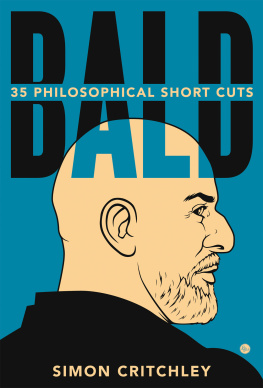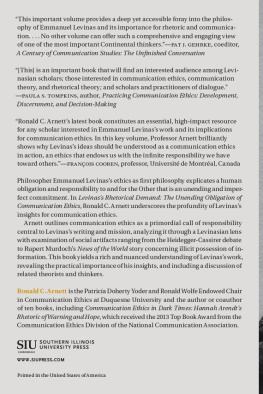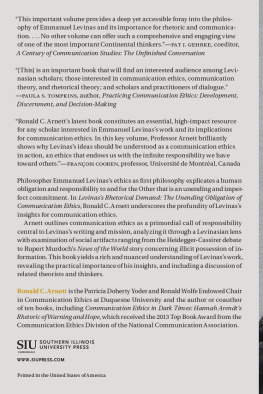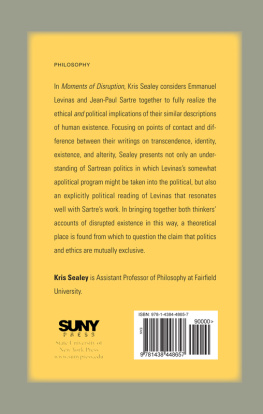The Problem with Levinas

Great Clarendon Street, Oxford, OX2 6DP, United Kingdom
Oxford University Press is a department of the University of Oxford. It furthers the University's objective of excellence in research, scholarship, and education by publishing worldwide. Oxford is a registered trade mark of Oxford University Press in the UK and in certain other countries
Simon Critchley 2015
The moral rights of the author have been asserted
First Edition published in 2015
Impression: 1
All rights reserved. No part of this publication may be reproduced, stored in a retrieval system, or transmitted, in any form or by any means, without the prior permission in writing of Oxford University Press, or as expressly permitted by law, by licence or under terms agreed with the appropriate reprographics rights organization. Enquiries concerning reproduction outside the scope of the above should be sent to the Rights Department, Oxford University Press, at the address above
You must not circulate this work in any other form and you must impose this same condition on any acquirer
Published in the United States of America by Oxford University Press 198 Madison Avenue, New York, NY 10016, United States of America
British Library Cataloguing in Publication Data
Data available
Library of Congress Control Number: 2014954690
ISBN 9780198738763
ebook ISBN 9780191058967
Printed and bound by
CPI Group (UK) Ltd, Croydon, CR0 4YY
Links to third party websites are provided by Oxford in good faith and for information only. Oxford disclaims any responsibility for the materials contained in any third party website referenced in this work.
PrefaceAll that Fall
In the emancipated man of modern society, this fracturing reveals that his formidable crack goes right to the very depths of his being. It is a self-punishing neurosis, with hysterical/hypochondriacal symptoms of its functional inhibitions, psychasthenic forms of its derealization of other people and of the world, and its social consequences of failure and crime. It is this touching victim, this innocent escapee who has thrown off the shackles that condemn modern man to the most formidable social hell, whom we take in when he comes to us; it is this being of nothingness for whom, in our daily task, we clear anew the path to his meaning in a discreet fraternitya fraternity to which we never measure up.
Lacan, Aggressivity in Psychoanalysis
The occasion for this book was a fall. Literally. A bump in the middle of the night. Staying in an unfamiliar house on the first night of a short vacation one June a couple of years back, while looking for the bathroom in pitch-blackness at 4:15 a.m., I fell down twenty steps into a basement and suffered a four-part fracture to my proximal humerus. Needless to say, this wasnt very humorous. I will spare you the gory details, which even involved cadaver bone being used surgically to reconstruct my joint (I am part corpse), but it meant that I spent the entire summer, about three months, unable to write or do much else.
During the spring semester, Id been teaching Emmanuel Levinas work for the first time in many years and it slowly began to dawn on me that I had something new that I wanted to say. For the first time, I began to see clearly the problem that Levinas work was trying to pose, and I also began to see my problem with his answer. I first tried to articulate this line of thought in a long, final lecture of my course at The New School and again during a series of seminars at the European Graduate School in the very first days of June. My plan was to spend the summer writing out my ideas, but then I fell, lived on a diet of painkillers, and had to restrict myself to making mental notes. Handwriting was impossible (it was the shoulder of my writing arm) and typing was one-handed and impossibly slow. I just began to store up more and more material in my head. It was really quite an odd experience.
In the last days of July, I was meant to teach a summer school course at Tilburg, in the Netherlands. I didnt want to go but I had to. I needed the money. To tell the truth, I was still in pretty bad shape. I decided to take a risk, abandon my previous teaching plan, and try and lay out my new thoughts about Levinas surrounded by lots of books, notes, and scraps of paper but without any script. Two lectures became three and eventually four, and Id like to thank the students for their patience, their attentiveness, and their questions. Thanks to Ivana Ivkovic, the lectures were recorded. Alexis Dianda very kindly offered to transcribe the lectures and then edited them expertly. This book is hers as much as it is mine. Once the transcription was made and the frame and form of the argument became explicit, I rewrote the text, but it still retains the oral style of its original delivery, even if this is a fiction, a conceit. The rewriting of the book was also highly influenced by a class I taught at The New School on mysticism, and Id like to thank the enthused students and my co-teacher and friend, Eugene Thacker. Finally, Id like to thank Peter Momtchiloff for agreeing to publish this book with Oxford University Press and my anonymous readers for their criticisms and suggestions.
I will leave it to the reader to judge the wisdom of this enterprise. All I can say in my defence is that having read and thought about Levinas obsessively for the past thirty-odd years, I found that the apparently improvised and live form of the lectures enabled me to express a significant number of things that I have long wanted to say about his work and some rather new things that sometimes surprised me. My inquiry into Levinas was based around five questions, as clear as they were vague. They are the following:
What method might we follow in reading Levinas?
What is Levinas fundamental problem?
What is the shape of that problem in Levinas early writings?
What is Levinas answer to that problem?
Is Levinas answer the best answer or might there be other answers?
*
So, was it a happy fall, a felix culpa with a second Adam atoning for the sins of the first? Hardly, and for reasons we dont need to go into. But there was something more in this fracturing of the body than a straightforward accident, an orthopaedic trauma requiring a surgical solution. As Lacan says, the fracture reveals a crack: the self-punishing character of the modern, emancipated individual and their desperate need to escape the social hell of their surroundings. This being of nothingness certainly described my condition. Perhaps it also describes Levinas. Despite the criticisms of Levinaswhich are, of course, attempts at self-criticismto which I am led in these lectures, I have tried to approach his writing and thinking in a spirit of discreet fraternity, a fraternity to which I know I will never measure up.
Contents
| ED | Essence and Disinterestedness. In Basic Philosophical Writings. Trans. and ed. Adriaan T. Peperzak, Simon Critchley, and Robert Bernasconi. Bloomington: Indiana University Press, 1996, pp. 10927. |
| EE | Existence and Existents. Trans. Robert Bernasconi. Norwell, MA: Kluwer Academic Publishers, 1988. |
| EP | Enigma and Phenomenon. In Basic Philosophical Writings. Trans. and ed. Adriaan T. Peperzak, Simon Critchley, and Robert Bernasconi. Bloomington: Indiana University Press, 1996, pp. 6577. |


















